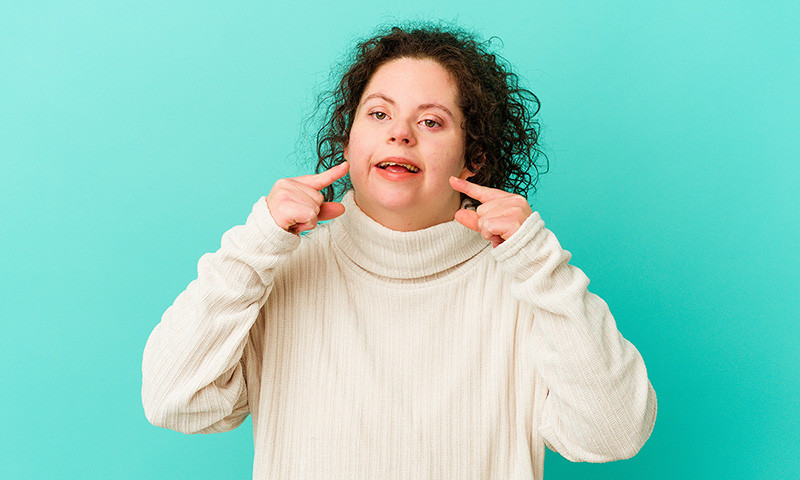The challenges
People with physical disabilities, such as hand weakness, lack of coordination or movement problems, may have difficulty performing the movements required for thorough and effective tooth brushing. This can lead to plaque accumulation, dental decay and gum diseases. Besides these physical challenges, there are also mental and cognitive ones. Difficulties in understanding or cognitive impairments can make it hard to maintain a regular and thorough brushing routine. Furthermore, fears and anxieties can be additional barriers.
Moreover, individuals with disabilities may struggle to find dental clinics that cater to their special needs. Difficulties in transportation, access to the clinic or communication with dentists can be further obstacles.
Possible solutions
Oral health is an important part of life quality and overall health. Especially people with Parkinson's and multiple sclerosis face unique challenges in maintaining oral health, but with the right tools and appropriate support, it is possible to maintain oral health and ensure a high quality of life. We have summarized a few tips for you below:
- Collaboration with professionals: It is important to collaborate with dentists who specialize in treating people with disabilities to ensure the right and appropriate approach.
- Regular visits to the dentist: More frequent visits to the dentist can help identify and treat problems at an early stage.
- Open communication with the dentist: It is crucial to discuss the unique challenges with the dentist and to find solutions that suit individual needs.
- Sticking to a routine: Creating a regular and tailored oral care routine adapted to the abilities and personal needs of the individual with the disability.
- Assistance from caregivers or family members: In cases where independent brushing is not possible, help from a caregiver or family member can be crucial.
Good to know:
There are special tools and devices for people with disabilities, such as the Samba toothbrush from Curaprox, which has been specifically designed to cater to those with disabilities. The most significant advantage of this toothbrush is that there is no need to move the hand or have fine motor skills. All that is needed is to hold the toothbrush and press a button to brush thoroughly and efficiently.
What is Parkinson's disease?
Parkinson's disease is a central nervous system disorder characterized by tremors, difficulty in movement and instability. People with Parkinson's face unique challenges in maintaining oral hygiene, especially in brushing their teeth. The ability to perform precise and fine movements is affected, which can impact the quality of brushing and overall oral health. Find an overview of the specific challenges people suffering from Parkinson's below:
Tremors and lack of motor control
The most common symptom of Parkinson's is tremors, which can make it difficult to grip and control the toothbrush. This can lead to people with Parkinson's not being able to clean their teeth thoroughly and evenly in all areas of the mouth.
Difficulty in fine movements
Difficulties in movement and coordination can make the process of brushing teeth complicated and exhausting. The fine movements required for thorough brushing may be too challenging to perform.
Difficulties in maintaining a brushing routine
Parkinson's disease can also affect memory and cognitive functioning, which may make it difficult to maintain a regular brushing routine.
What is multiple sclerosis?
Multiple sclerosis (MS) is a central nervous system disease characterized by damage to the myelin sheath surrounding the nerves. It is a chronic illness that can affect various aspects of daily life, including oral and dental health. Awareness of the unique challenges faced by people with multiple sclerosis in maintaining oral hygiene is vital for ensuring a better quality of life.
Difficulty in performing fine movements
People with multiple sclerosis may have difficulty performing fine movements, such as those required for brushing teeth.
Pain and sensory disturbances
Pain, sensory disturbances or hypersensitivity in the mouth can make brushing and using dental floss difficult.
Dealing with medications
Certain medications used to treat multiple sclerosis can cause side effects like dry mouth, which can increase the risk of dental decay and gum inflammation.
Children with special needs
Parents of children with disabilities face unique challenges in maintaining their children's oral hygiene. This challenge requires patience, understanding and sometimes creativity. To assist in this process, we have listed four practical tips below that can make the process easier as well as more pleasant and effective for both you and your child:
Choosing a reward from a variety of options:
Children love rewards, and this can encourage them to maintain oral hygiene. Set up a reward system where the child can choose from a variety of options after effective brushing. This could be a sticker, extra playtime or a bedtime story. The main thing is that the reward is something your child likes and looks forward to.
Incorporating stories:
Turn the brushing process into a storytelling experience. For example, you can tell the child that they are "chasing the sugar bacteria" in their mouth. This can make brushing a fun and imaginative game and encourage your child to use the toothbrush in all the important corners of the mouth.
Starting with short brushing, then gradually increasing the duration:
Children with disabilities may find it difficult to concentrate for a long time. Therefore, start with a short tooth brushing time and gradually increase the duration. This will help them get used to the process and feel less stressed about the brushing time.
Choosing toothpaste flavors:
Sometimes the taste of the toothpaste can be a deterrent for children. Let your child choose their favorite toothpaste flavor. This could be a fruity flavor, mild mint or any other flavor– for example Curaprox kids toothpaste with watermelon flavor. The choice will add motivation and make the process fun and not just a chore.
For children over the age of 13 and adults, we recommend trying the Samba toothbrush from Curaprox, which allows your child to brush their teeth easily, without the need for concentration or complex motor activity. If you are the one brushing your child's teeth, Samba will not only make your job easier and clean their teeth more efficiently, but your child may also become completely independent in maintaining their oral health.
Try it for 60 days risk-free with a full money-back guarantee if you decide the solution is not right for your child.
Navigating dental visits with a special needs child
Taking a child with special needs to the dentist can be a daunting experience for both the child and the parent. Dental visits can involve unfamiliar environments, sounds and sensations that may be challenging for children with sensory sensitivities, communication difficulties or other special needs. However, with preparation and the right approach, dental visits can become a manageable part of your child's healthcare routine. Here are some strategies to help you navigate these visits more effectively.
Finding the right dentist:
Start by finding a dentist who has experience in treating children with special needs. You can ask for recommendations from your child's doctor, support groups or other parents. Once you find the right dentist, make an appointment to discuss your child's needs, concerns and any accommodations that might be necessary.
Pre-visit preparation:
Prepare your child for the dental visit by explaining what will happen in simple, reassuring terms. Use storybooks, videos or picture schedules about dental visits. For children who benefit from knowing what to expect, consider creating a step-by-step story of the visit.
Familiarization visits:
If possible, arrange for your child to visit the dental office before the actual appointment. Letting your child explore the waiting room, meet the dentist and sit in the dental chair without the pressure of an examination can reduce anxiety for future visits.
Timing and comfort:
Schedule the appointment at a time of day when your child is usually most calm and cooperative. Bring along any comfort items, such as a favorite toy, blanket or headphones with music or a calming audio story.
Reinforcing positive behavior:
After the visit, praise your child for their bravery, regardless of how the visit went. You can use a reward system or provide a small treat as an encouragement for future visits.
Remember that every child is different, and what works for one child may not work for another. It may take several visits to find a routine that works well for your child. Be patient and keep in close communication with your dentist to ensure your child's dental visits are as smooth and stress-free as possible. Over time, with consistent effort and the right approach, dental care can become a less challenging part of your child's life.
Old people
In the elderly, maintaining oral hygiene is not just a matter of appearance or comfort but a question of overall health. Inefficient tooth brushing can lead to many problems that affect quality of life and can endanger health. Understanding the unique challenges of this age and using appropriate tools can help overcome these challenges.
Challenges of tooth brushing in the elderly
There are several factors that can make effective tooth brushing difficult for old people, for example:
- Physical weakness and limited function: Fatigue, weakness or reduced hand function can make the physical act of brushing challenging.
- Chronic diseases: Diseases such as arthritis, Parkinson's or other neurological disorders can hinder the grip and fine movement required for brushing.
- Vision problems: Diminished vision can make it difficult to identify food residues or plaque between teeth.
- Reduced sensation: Changes in the sense of touch can make it hard to understand when and how to brush effectively.
Dangers of inefficient brushing
Inefficient brushing can lead to a variety of problems, including:
- Gum inflammation and oral diseases: Accumulation of plaque and bacteria can cause inflammation of the gums (gingivitis), leading to pain and even tooth loss.
- Dental decay: Lack of proper brushing can increase the risk of dental decay and the need for dental treatments.
- Risks to overall health: Oral diseases can affect overall health, including increased risks of heart diseases and inflammations.
Solutions and coping
The Samba toothbrush from Curaprox, specifically designed for the elderly, is the first toothbrush to provide a comprehensive solution to these problems:
- Effortless brushing: The brushing motion performed by Samba, which includes a combination of high and low frequencies, eliminates the need to move the hand during brushing, except for holding the brush in place.
- Speed: The fact that 36 tooth surfaces are brushed simultaneously, compared to one surface at a time with a regular brush, reduces the brushing time to just 30 seconds per jaw.
- Comfortable grip: The brush handle is designed for a comfortable and secure grip, suitable even for those with hand weakness or arthritis.
By using Samba, it is possible to deal with the unique challenges of the elderly and maintain oral health efficiently and comfortably. It allows seniors to maintain their independence and health and to continue enjoying a high quality of life.
The connection between oral health and overall health
Oral health is not just about maintaining a beautiful smile or fresh breath, it also significantly impacts our overall health. Numerous studies indicate a direct connection between oral problems and various body diseases. Find an overview of some of the most important aspects of this connection below:
Heart and kidney health
Gum inflammation, one of the most common oral health problems, can lead to an increased risk of heart diseases. Bacteria from the mouth can enter the bloodstream and cause inflammation in the heart and kidney systems.
Diabetes
There is a close connection between diabetes and gum diseases. Gum inflammation, also known as gingivitis, can exacerbate diabetes and make it harder to control blood sugar levels. Conversely, diabetes can increase the risk of developing gum inflammation.
Pregnancy
Pregnant women with gum inflammation are at an increased risk of premature birth and low birth weight babies. Oral health care can be an important part of medical care during pregnancy.
Infections and other diseases
Bacteria from the mouth can reach different systems in the body and cause infections and inflammations. Gingivitis is also linked to lung diseases, such as pneumonia and bronchitis.
Impact on general functioning
Oral health is part of our overall health. Pain, inflammation and tooth loss can affect eating, speaking and self-confidence.
Maintaining oral health is not just a matter of aesthetics, it is an integral part of maintaining overall health. Regular visits to the dentist, thorough brushing and using interdental brushes or dental floss are part of the daily routine and very important for maintaining our health.
Good to know:
Interdental brushes are highly efficient without the need for any hard bristles. Quite the contrary: They have to be soft to prevent damaging your teeth and irritating your gums. Our interdental brushes are equipped with ultra-fine bristles – tiny individual hairs – that are soft, efficient and boast rounded tips.
Foods to avoid for improved oral health
Maintaining oral health is an important part of sustaining a high quality of life, especially for people with disabilities who may struggle with proper oral hygiene. An important part of combating oral infections and diseases is a tailored diet. We have listed five foods below that you should reduce or avoid to improve oral health:
Sweetened and sugary drinks
Sweetened drinks, including sweet juices and sodas, contain high amounts of sugar that can feed harmful bacteria in the mouth. These bacteria produce acid that damages the teeth and can lead to decay. Additionally, for people with disabilities who may have difficulty brushing, the risk of damage from these types of drinks is higher.
Sticky sweets
Sticky sweets such as jelly, gummy candies and caramel stick to the teeth and provide a continuous source of sugar for harmful mouth bacteria. This increases the risk of developing dental decay and gum diseases. Especially for children with disabilities who may struggle with full oral hygiene, it is important to avoid these sweets.
Salty and starchy snacks
Snacks like chips and pretzels contain high levels of starch, which is converted into sugar by mouth bacteria. This can lead to dental decay and gum disease. Particularly children with disabilities who have difficulty brushing should limit the consumption of these snacks.
Acidic foods
Acidic foods like lemons and tomato sauce contain acids that can damage the minerals composing the teeth and lead to tooth erosion. For people with disabilities who have difficulty maintaining thorough brushing, it is crucial to limit the amount of acidic foods they eat.
Alcohol
Excessive alcohol consumption can dry out the mouth and reduce saliva flow, which plays a central role in cleaning the mouth from plaque and bacteria. Additionally, some alcoholic beverages contain high levels of sugar or acids. For people with disabilities who struggle with maintaining oral hygiene, it is important to keep alcohol consumption to a minimum.
Ultimately, maintaining a balanced diet and avoiding foods that harm oral health is an important part of preserving oral health, especially among individuals with disabilities who may face additional challenges in this area.
Delicious foods that do not harm your teeth
Maintaining dental health is very important, not just for your appearance. Oral and dental health affects overall health and quality of life. Therefore, choosing foods that are both healthy for the teeth and delicious is especially important. Here you will find four foods that are not only good for your teeth but also contribute to your overall health:
Cheese
Cheese is an excellent source of calcium, which strengthens the teeth and bones. It also helps balance the pH level in the mouth, reducing the risk of dental decay. In addition, the protein in cheese helps protect the dental system.
Apples
Apples, sometimes called 'nature's toothbrush' contain dietary fibers that help clean the teeth and remove food residues. They also stimulate saliva production in the mouth, a process that is good for cleaning the mouth and teeth.
Carrots
Carrots are a vegetable rich in Vitamin A, which is essential for maintaining gum tissue. Consuming raw carrots helps clean the teeth and stimulates saliva production, while providing a sweet and fresh taste.
Green tea
Green tea contains antioxidants that help fight bacteria and prevent gum inflammation. It can also reduce the risk of dental decay and gum diseases. In addition, green tea helps maintain a fresh breath.
 Swiss premium oral care
Swiss premium oral care









